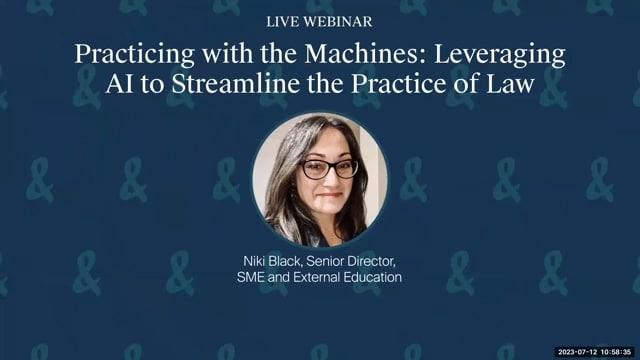Key takeaways
Will lawyers be replaced by AI? No, Generative tools can’t match a lawyer’s judgment, advocacy, or duty of care.
AI is stepping in to shoulder the rote, high-volume tasks like research drudgery, document review, and the endless admin that fuels burnout.
With AI handling routine tasks, you can spend more time on strategy, client counsel, and courtroom craft.
For centuries, lawyers have been trusted advisors in navigating the legal system. However, with the rise of artificial intelligence (AI), a question looms: Will AI replace lawyers?
Generative AI technology can’t argue before a judge, negotiate a settlement, or shoulder a client’s worries, but it can replace the parts of your job that feel like a second full-time role.
And the data shows that law firms have been embracing the technology. According to the 2025 Legal Industry Report, 31% of attorneys used AI on the job in 2024, and 45% of those users tapped it every day.
In this post, we’ll dig into exactly how AI is reshaping legal practice today and where it can give you back the hours that matter.
For more insights across everything from AI ethics to legal research to firm productivity, explore our AI for Law Firms Resource Center for the full library of expert articles.
What Is the Role of AI in Law Today?
AI now functions as an on-demand efficiency engine for law firms, automating the repeatable tasks that drain billable hours and compound deadline anxiety.
Five core areas AI tools can streamline are: legal research, document review, due diligence, e-discovery, and everyday practice operations. By handling high-volume, repetitive work, AI in law especially frees solo and small-firm attorneys who already wear too many hats to focus on strategy, client counsel, and revenue-generating advocacy.
1. Legal Research
AI-powered legal research tools can swiftly sift through vast amounts of legal data, aiding in comprehensive legal research. Type a plain-language question, and large-language-model engines return the most relevant authorities, extract key passages, and even flag contradictory precedents. Legal generative AI can enhance this process by quickly drafting initial drafts of documents.
For example, a solo personal-injury attorney up against a 48-hour motion cutoff can drop the fact pattern into an AI workspace and receive a ranked citation list with pinpoint summaries, plus a draft argument outline, in minutes.
2. Document Review
AI legal document summarizers are natural language processing algorithms that can identify key clauses, flag risks, and ensure compliance with legal standards.
For example, a solo employment lawyer defending a multi-plaintiff wage claim can upload 10,000 emails to an AI module inside a legal practice management system. The tool can then flag every message containing overtime calculations, pull out potential smoking-gun threads, and generate a defensible audit trail.
3. Due Diligence
AI-driven due diligence tools comb through corporate records, vendor contracts, and financial statements to help spotlight missing signatures, change-of-control clauses, and compliance gaps that could derail closing.
This software helps attorneys save hours through several automations, like clustering similar documents and generating issue lists.
Picture a two-partner firm advising a startup on a tight-deadline acquisition. Instead of days spent leafing through 300 vendor agreements, the team uploads the data to its AI workspace. The platform quickly:
Highlights contracts with non-assignment clauses
Creates a summary table
Maps renewal dates against the closing timeline
4. E-Discovery
AI revolutionizes the e-discovery process through automated identification, collection, and analysis of electronic data. Machine learning algorithms can categorize documents, prioritize relevance, and identify patterns within large datasets, reducing the time and cost associated with e-discovery proceedings.
A civil rights firm with a data dump of 450,000 municipal emails can feed the archive into their practice platform’s AI module. The system can surface every chain containing discriminatory language and flag attorney-client communications for privilege, helping the team focus on strategic depositions rather than file triage.
5. Operational Tasks
Behind every brief lurks a mountain of invisible work, like time entries, client intake forms, and compliance checks. AI-enabled practice management tools now automatically capture many of those tasks.
They listen to meetings and generate polished notes, translate phone calls into time entries, draft onboarding letters, and monitor flag trust-account anomalies before they become bar nightmares.

When Is Human Judgment Still Useful?
Human judgment is irreplaceable wherever the law demands nuance, empathy, and ethical discretion. Algorithms can rank precedents, but only a lawyer can weigh a client’s risk tolerance, gauge a judge’s temperament, and craft a strategy that balances legal theory with real-world stakes.
Human insight is key for complex negotiations, sensitive client conversations, and creative argumentation, all tasks that no machine can truly emulate.
1. Complex Decision-Making
While AI excels at tasks with clear parameters, complex legal decisions require nuanced interpretation. When a matter pivots on strategic trade-offs, human attorneys synthesize legal precedent, ethics rules, and intangible client priorities into a single course of action. Those layered decisions remain squarely in the lawyer’s court.
2. Client Interaction
Legal matters are as emotional as they are procedural. Only a lawyer can read a client’s anxiety and offer the calm, empathetic guidance that builds lasting trust. While virtual assistants and AI-powered chatbots can handle basic inquiries and administrative tasks, they can’t replace that intuition and personal touch.
3. Creativity and Innovation
Groundbreaking arguments, precedent-shifting strategies, and outside-the-box settlement structures come from human ingenuity, not pattern-matching code.
Sure, AI can remix existing language, but it can't envision a novel legal theory, reframe a statute to fit an emerging technology, or spin a complex fact pattern into a compelling narrative.
What Are the Advantages of AI For Lawyers?
AI’s greatest gift to attorneys is time. Automated research, real-time time capture, and instant document summaries recover hours each week that mean fewer late nights and a lower risk of missed deadlines.
By handing off the repetitive chores that burn you out and drain capital, the technology lets you redirect attention to strategic counsel and revenue-generating advocacy.
Other benefits of using legal AI:
Improved productivity: Tasks that once required paralegals or temp reviewers now finish in minutes, allowing you to handle larger caseloads without ballooning overhead. The financial upside is lower support-staff expenses and more billable capacity per lawyer.
Efficient decision-making: AI dashboards can give you data-backed confidence when advising clients or negotiating settlements. Faster insights can translate into quicker case movement and quicker payments.
Better client service: When routine touchpoints run themselves, you can focus on offering the empathy and strategic guidance that cements long-term loyalty.
What Are the Disadvantages of AI For Lawyers?
Even the smartest tech has blind spots. While AI can erase hours of drudgery, it also introduces new risks that every firm must weigh before rolling out the latest tool.
Ethical considerations: AI can blur the line between delegation and unauthorized practice. Attorneys remain responsible for every word filed, so it’s crucial to vet outputs for completeness and candor, no matter how polished the draft looks.
Data security and confidentiality risks: Feeding client files into third-party systems invites exposure. Firms that don't prioritize AI vendors that offer end-to-end encryption, strict data segregation, and SOC-2-level controls could face a bar complaint as well as a breach notification.
Accuracy and biases: Large language models occasionally hallucinate citations or replicate historical bias baked into training data. Without rigorous human review, a phantom case or discriminatory clause can slip into your brief and damage credibility.
Implementation costs and learning curves: Subscription fees, data-migration projects, and staff training eat into early ROI. Small firms must budget both dollars and hours to integrate AI smoothly and factor in the ramp-up period before savings appear.
3 Expert Opinions on the Future of AI and Law
Lawyers aren’t the only ones taking notes. Legal technologists, academics, and bar leaders are already trying to answer the question on everyone’s mind: Can AI replace lawyers? We gathered three expert voices. Their perspectives underscore how AI will continue to shape the legal profession, driving efficiency and innovation.
Optimize Attorney Focus
One of AI’s most immediate wins is freeing lawyers to focus on deep strategic work; the kind that secures better outcomes and happier clients.
Transform Core Legal Work
AI is already reshaping the substantive heart of practice by automating tedious but essential work. When algorithms surface airtight precedents and auto-assemble first-draft motions, attorneys spend less time wrestling with formatting quirks and more time honing arguments that win cases.
Co-founder of Docketwise (An Affinipay Solution), James Pittman confirms this, saying “I firmly believe that AI will catalyze a profound transformation within the legal profession, particularly in the realms of legal research, document production, discovery, and strategic decision-making.
"By leveraging the capabilities of AI technology, practitioners will be empowered to conduct comprehensive and nuanced legal research, enabling them to analyze issues, apply relevant laws to facts, draw insightful analogies from case law and secondary sources, and efficiently create top-quality pleadings, forms, briefs, motions, etc."
Continues Pittman, "Moreover, AI-driven tools will streamline the discovery process by swiftly analyzing vast amounts of information to filter out pertinent data, thereby enhancing efficiency and efficacy. Predictive analytics, facilitated by AI, will further augment decision-making processes, enabling lawyers to make sophisticated, data-driven choices regarding case strategy.
Address Legal Supply Shortage
Across the United States, legal demand outpaces supply, especially in rural counties where few attorneys hang a shingle. By automating repetitive work , AI lets a single lawyer handle a caseload that once required a full support team, expanding access to counsel without inflating overhead.
How Can Lawyers Start Adapting to an AI-Driven Future?
Lawyers can start adapting to AI by identifying needs, starting small, and continuing to integrate usage as they learn more and get familiar with these emerging tools. AI tools, from ChatGPT to practice-management dashboards, are already rewriting the daily playbook.
1. Identify the Areas of Your Firm That AI Will Impact the Most
Start by understanding how AI can benefit your specific practice. Analyze your current workflow and identify tasks ripe for automation. This could include streamlining routine tasks or reducing time spent on manual legal research.
2. Focus on Enhancing, Rather Than Replacing Your Tech Stack
When integrating AI into your tech stack, prioritize enhancement over replacement. For example, MyCase’s built-in AI offers document summaries, tone tweaks, writing polish, and instant translations right alongside matter files.
You gain cutting-edge capability without fully rebuilding your tech stack. Enhancing existing infrastructure also preserves data integrity, shortens the learning curve, and lets you measure time savings immediately.
3. Prioritize Your Clients’ Security and Confidentiality
Protecting your clients’ security and confidentiality is paramount in the legal profession. Any AI tool you deploy must meet the bar’s highest standards.
A few features you can look for:
Built-in safeguards: Features like encryption and permission controls can help prevent unauthorized access or data reuse.
Ethical design: Document summaries, text edits, and message drafts stay inside your case workspace, preserving client trust while eliminating copy-and-paste risk.
Trusted provider: By layering AI onto MyCase’s SOC-2-certified platform, you gain automation without sacrificing the security controls you and your clients expect.
4. Embrace Continuous Education
Staying informed is key to remaining competitive and ethical in the evolving landscape of AI in the legal profession. Set aside time each quarter to track new tools, ethics opinions, and regulatory shifts.
AI skills to add to your toolbox include:
Data literacy: Know what data you have, where it lives, and how models use it so you can spot privacy or bias risks early.
Prompt engineering: Craft clear, context-rich prompts to get accurate, citation-ready outputs from tools like a legal ChatGPT assistant.
Model evaluation: Learn basic metrics to judge whether an AI system’s results are reliable enough for client work.
Risk triage: Develop a checklist for privilege, confidentiality, and bias checks before any AI-generated content leaves your draft folder.
Become an AI-Powered Law Firm With MyCase
As we ponder questions like “Will AI replace lawyers?” and “Will lawyers be in demand in the future?”, one thing is clear: Integrating AI into the legal profession is inevitable.
AI is here to lift the work that fuels burnout and drains capital. It drives efficiency and new avenues for growth, all while empowering lawyers to spend more time focusing on delivering the best outcome possible for their clients. Even as AI reshapes the legal landscape, judgment, empathy, and ethical reasoning will continue to be essential.
Explore MyCase’s legal AI software to see how built-in document summaries, smart drafting, and secure collaboration can streamline every matter from intake to invoice. The platform also prioritizes security. MyCase IQ’s responsible generative AI uses encrypted data flows, firm-specific isolation, and does not train on your confidential files.
Schedule a demo to discover how MyCase delivers an end-to-end, AI-enabled workflow, freeing you to practice law, not paperwork.
Next, take a practical look at how legal professionals are already using these tools in Generative AI for Law Firms: What It Is and How To Use It.
FAQs About AI and Law
About the author
Gabriela is a creative and results-driven SEO specialist dedicated to helping small businesses and professional service firms excel online. She leverages over six years of digital marketing experience to provide in-depth, authoritative content required for regulated industries like accounting and legal technology. Her work focuses on bridging complex financial and compliance topics with clear, actionable guidance. The core aim of her content is to deliver compliant, data-driven strategies that help practitioners streamline their operations, maximize firm cash flow, and grow their online presence.

